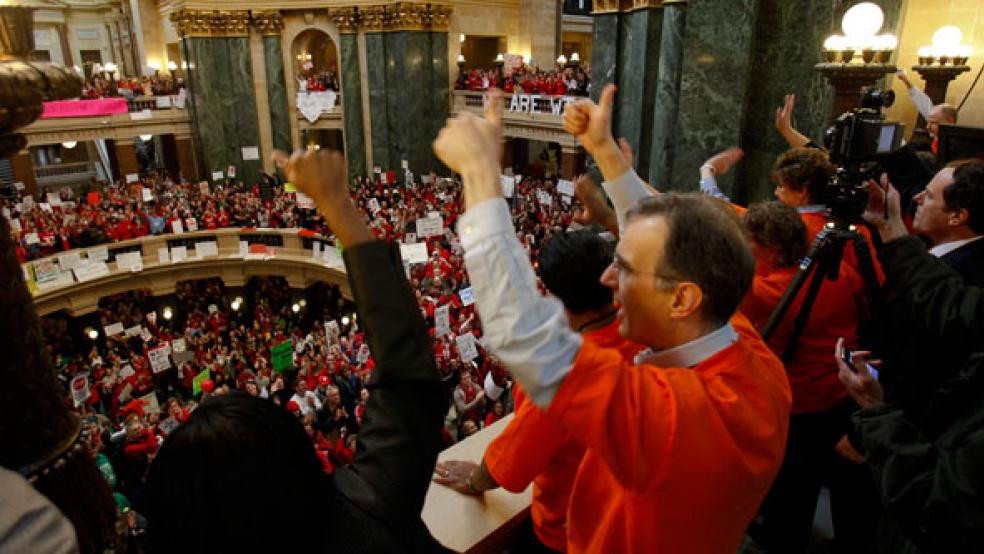The Michigan House of Representatives on Tuesday gave final approval to a "right-to-work" law covering public sector workers such as teachers, which would make union membership and payment of dues voluntary. The Republican-majority House passed the law by a vote of 58 to 51. The only government workers excluded would be police and fire unions.
A second bill applying "right-to-work" to the private sector in the state that is home to the large U.S. auto industry, is expected to be debated and approved by the House later on Tuesday.
Approval of right-to-work strikes a major blow to organized labor in the United States because Michigan is a stronghold of unions.
On Tuesday morning, more than 12,000 workers from throughout Michigan and the U.S. Midwest crowded into the state Capitol and marched outside in freezing temperatures as the legislature began debate of a "right-to-work" law restricting unions. Michigan State Police Inspector Gene Adamczyk said the Capitol building was closed to visitors when it reached capacity of 2,200. An estimated 10,000 people demonstrated outside.
Protesters lined the railings of the inner rotunda of the Capitol in Lansing as the Republican-majority Michigan House of Representatives began debate on a law that would strike a heavy blow against unions by prohibiting them from compelling workers to be members and pay dues.
The pro-union forces earlier had chanted "Hey hey, ho ho, right-to-work has got to go," and "What's disgusting, union busting," inside the building where police had arrested eight protesters last Thursday as Republicans gave preliminary approval to the laws.
Supporters of the right-to-work legislation also were inside the Capitol and on the grounds nearby, although they were heavily outnumbered by opponents. Security was tight with police dressed in riot gear, carrying long batons and with spray canisters on their belts.
Outside, where a nearby bank sign showed the temperature at 25 degrees Fahrenheit (-4 Celsius) and light snow fell, four inflatable rats dubbed the "Rat Pack" depicted Republican Governor Rick Snyder and the party leaders who have led the right-to-work effort. A man dressed as Santa Claus stood on the Capitol steps holding a sign saying that Republicans had stolen Christmas.
FAMILIAR RING TO IT
The show of force by unionized workers recalled huge rallies in Wisconsin two years ago when Republicans voted to curb public sector unions. Several school districts in Michigan were closed as teachers went to Lansing to join the rallies.
Jen Penz, a union steward for teacher aides at Warren Consolidated Schools, said 260 teachers called in sick there, forcing schools to close in the district near Detroit. "We're not abandoning our students. We're here to protect their future," Penz said. "We're setting a good example for them.
Ann Patnaude, deputy state director for Americans for Prosperity and a supporter of right-to-work, said many people are confused about the issue. "The unions are still going to be around," she said. "There's still going to be collective bargaining. This is about freedom, the right to choose."
The bills that were under consideration by the Republican-controlled Michigan House of Representatives would cover private, and public sector unions, except for fire and police. Snyder has pledged to sign the bills quickly.
The right-to-work movement has been growing in the United States in recent years. Indiana earlier this year became the first state in the industrial Midwest to approve right-to-work and several other states are watching the Michigan action closely.
Michigan has now become the 24th state to enact right-to-work provisions. Passage of the legislation was thought to be a stunning blow to the power of organized labor in the United States, which has suffered a series of setbacks in recent years. Wisconsin Republicans in 2011 passed laws severely restricting the power of public sector unions. While Wisconsin did not even attempt to pass right-to-work, the success of Republicans there in curbing powerful unions such as teachers and state workers emboldened politicians in other states to follow suit.
UNION HOTBED
Michigan is home of the heavily unionized U.S. auto industry, with some 700 manufacturing plants in the state. It is also the birthplace of the United Auto Workers, the richest U.S. labor union. Michigan has the fifth highest percentage of unionized workers in the United States at 17.5 percent.
While new Michigan laws would not be expected to have much immediate impact because existing union contracts would be preserved, they could eventually weaken the UAW, which has already seen its influence wane in negotiating with the major automakers. Right-to-work laws typically allow workers to hold a job without being forced to join a union or pay union dues.
President Barack Obama waded into the debate during a visit to the Daimler Detroit Diesel plant in Redford, Michigan, on Monday, criticizing the Republican right-to-work effort. "What they're really talking about is giving you the right to work for less money," Obama said.
Labor leaders such as UAW President Bob King say they were blindsided by Snyder, who last Thursday announced he was supporting right-to-work after nearly two years of saying the issue was too divisive. King was unsuccessful in more than a week of talks with Snyder and his staff in staving off the right-to-work push by the Republicans, who will lose several seats when newly elected members take their seats in the Michigan House and Senate in January.
Detroit area is headquarters for General Motors Co, Ford Motor Co and Chrysler, which is majority owned by Fiat SpA.
(Reporting by Bernie Woodall, David Bailey and Robert Carr of Reuters)




